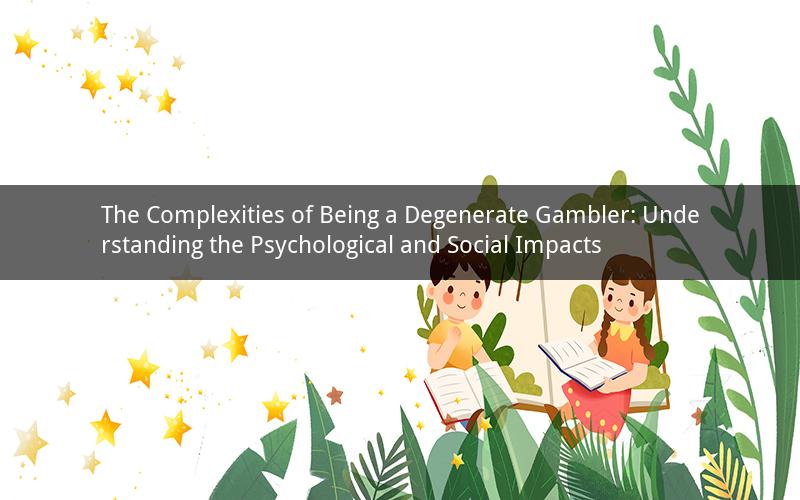
Introduction:
The term "degenerate gambler" carries a negative connotation, often associated with problem gambling and its destructive consequences. However, to truly understand what it means to be a degenerate gambler, one must delve into the psychological and social aspects of gambling addiction. This article aims to explore the various dimensions of being a degenerate gambler, shedding light on the factors that contribute to this behavior and the impact it has on individuals and society.
I. The Psychological Underpinnings of Degenerate Gambling
1. The Need for Thrill and Excitement:
One of the primary reasons individuals become degenerate gamblers is the intense desire for excitement and thrill. Gamblers often seek the adrenaline rush that comes with taking risks and the possibility of winning big. This need for thrill can lead to a cycle of escalating risk-taking and compulsive gambling behavior.
2. Psychological Disorders:
Certain psychological disorders, such as impulsivity, anxiety, and depression, can increase the likelihood of becoming a degenerate gambler. These conditions often lead individuals to seek escape or relief through gambling, exacerbating their addictive tendencies.
3. Cognitive Biases:
Cognitive biases, such as the availability heuristic and overconfidence, can also contribute to degenerate gambling. These biases can lead individuals to overestimate their chances of winning and underestimate the potential consequences of their gambling behavior.
II. The Social Impacts of Degenerate Gambling
1. Financial Consequences:
The financial impact of degenerate gambling can be devastating. Individuals may go into debt, lose their homes, and face financial ruin as a result of their gambling addiction. This not only affects the gamblers themselves but also their families and loved ones.
2. Relationships and Social Isolation:
Degenerate gamblers often experience strained relationships with family and friends. The secrecy and lies associated with gambling addiction can lead to feelings of guilt, shame, and betrayal, ultimately resulting in social isolation.
3. Criminal Activity:
In some cases, degenerate gamblers may resort to criminal activity to fund their gambling habits. This can include theft, fraud, and other illegal activities, further exacerbating the negative social impact of their addiction.
III. Coping with Degenerate Gambling
1. Seeking Professional Help:
One of the most effective ways to cope with degenerate gambling is to seek professional help. Therapists and counselors can provide support, guidance, and strategies to overcome the addiction. Treatment may include cognitive-behavioral therapy, medication, and support groups.
2. Building a Support Network:
Creating a strong support network is crucial for individuals struggling with degenerate gambling. This network can include friends, family, and support groups that provide emotional support and hold individuals accountable for their actions.
3. Developing Healthy Coping Mechanisms:
It is essential for degenerate gamblers to develop healthy coping mechanisms to replace the negative behavior of gambling. Activities such as exercise, hobbies, and mindfulness practices can help individuals manage stress and avoid relapse.
IV. The Role of Society in Addressing Degenerate Gambling
1. Awareness and Education:
Society plays a crucial role in addressing degenerate gambling by raising awareness and providing education on the risks and consequences of gambling addiction. This can help prevent individuals from developing problematic gambling behaviors in the first place.
2. Responsible Gambling Policies:
Implementing responsible gambling policies, such as age restrictions, deposit limits, and self-exclusion programs, can help mitigate the risks associated with degenerate gambling. These policies can be enforced by both the gambling industry and regulatory bodies.
3. Support and Resources:
Society should provide accessible support and resources for individuals struggling with degenerate gambling. This can include counseling services, support groups, and hotlines that offer immediate assistance.
Conclusion:
Being a degenerate gambler is a complex issue that involves psychological, social, and financial factors. Understanding the underlying causes and consequences of degenerate gambling is crucial for individuals seeking to overcome their addiction and for society as a whole. By addressing the psychological underpinnings, social impacts, and coping strategies associated with degenerate gambling, we can work towards a more informed and compassionate approach to this challenging issue.
Questions and Answers:
1. Q: What are some common symptoms of degenerate gambling?
A: Common symptoms include increased time spent on gambling activities, neglecting responsibilities, borrowing money to fund gambling, feeling remorse or guilt after gambling, and an inability to control gambling behavior.
2. Q: How can someone overcome a degenerate gambling addiction?
A: Overcoming a degenerate gambling addiction involves seeking professional help, building a support network, and developing healthy coping mechanisms. It is essential to address the psychological and social aspects of the addiction to achieve lasting recovery.
3. Q: Can degenerate gambling lead to criminal activity?
A: Yes, in some cases, individuals struggling with degenerate gambling may resort to criminal activity to fund their addiction. This can include theft, fraud, and other illegal activities.
4. Q: Are there any effective treatments for degenerate gambling addiction?
A: Yes, effective treatments for degenerate gambling addiction include cognitive-behavioral therapy, medication, and support groups. These treatments can help individuals develop healthier gambling behaviors and reduce the risk of relapse.
5. Q: How can society help prevent degenerate gambling?
A: Society can help prevent degenerate gambling by raising awareness, implementing responsible gambling policies, and providing accessible support and resources for individuals struggling with gambling addiction. Education and advocacy are key components in addressing this issue.